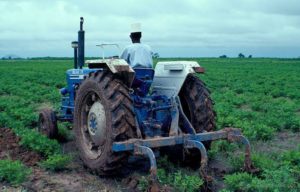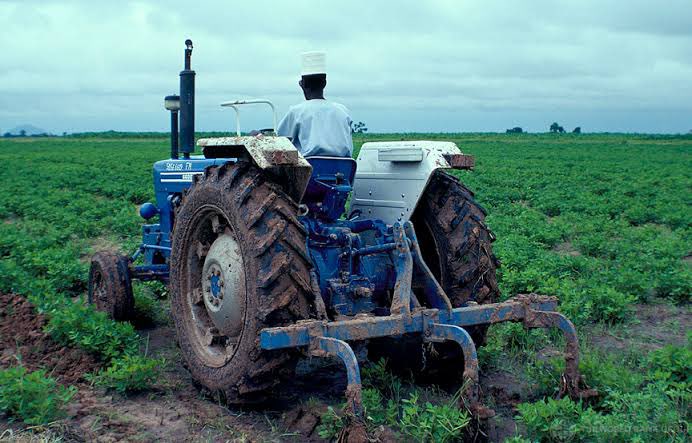
By Adeyemi Adekunle
Nigerian farmers might soon find relief in the form of modernized agricultural tools as the federal government announced the arrival of 255 tractors from a larger order of 2,000 placed nearly a year ago.
This initiative comes at a critical time, with food inflation soaring to approximately 34 percent, a harsh reality for families grappling with rising costs of staple foods. For many, the tractors symbolize not just machinery but hope—a chance to reduce manual labor, increase productivity, and bridge the gap in a food system strained by inefficiencies.
The Minister of Agriculture and Food Security, Senator Abubakar Kyari, shared the progress during a recent press briefing at the State House. With a tone of determination and optimism, he laid out a detailed plan that goes beyond just the tractors.
For every tractor, there will be a suite of implements, including ploughs, harrows, seeders, and boom sprayers, ensuring that farmers have the full package of tools necessary to improve efficiency in land preparation, planting, and spraying.
“Tractors by themselves cannot work miracles,” Senator Kyari acknowledged. “But when paired with ploughs, harrows, seeders, and sprayers, they transform fields and livelihoods. With 9,000 implement sets accompanying this procurement, every tractor is a multipurpose solution.”
To ensure farmers can access the tools and services in the long term, plans include 9,000 sets of spare parts and mobile service vehicles stationed across farming areas.
Kyari highlighted the importance of these mobile workshops, calling them lifelines for regions where farming tools can easily break down and remain inoperative due to a lack of technical support.
“Twelve mobile workshops will be deployed to handle emergency repairs, ensuring farming never halts when time is of the essence,” he explained.
The Minister’s announcement further emphasized large-scale machinery, with 10 combined harvesters capable of covering one and a half hectares per hour. These advanced harvesters, according to Kyari, could process the equivalent of 13 football fields of farmland daily. “Imagine a farmer’s field cleared in just a day instead of weeks of backbreaking labor. This is not just about efficiency; it’s about revolutionizing lives.”
For families like the Olanrewajus, subsistence farmers in Nasarawa, this development feels like a glimmer of hope in challenging times. “We farm corn and soybeans. By the time we finish planting or harvesting manually, half of our produce doesn’t even make it to market because of delays. Sometimes the rains destroy what’s left,” said Mariam Olanrewaju. “With tools like these, we can plant faster and maybe grow more food.”
The announcement comes with a promise of accountability. Kyari shared that while 255 tractors had arrived, over 85 containers filled with machinery and spare parts are currently in transit, arriving almost weekly. Each container, carrying up to three tractors, is a visible marker of progress in fulfilling the commitment to modernize Nigerian agriculture.
“By the end of this exercise, we’ll have a fleet of 2,000 tractors, 1,200 trailers, and massive operational capabilities for all kinds of crops,” the Minister stated confidently. Yet, he admitted that the initiative wasn’t perfect. “Some trailers from past use are being rehabilitated through partnerships, so we’ve scaled down the number of new trailers procured. This way, we’re not being wasteful.”
In tandem with these measures, Senator Kyari outlined plans to recapitalize and reorganize the Bank of Agriculture, promising a stronger foundation to support long-term agricultural financing. He assured Nigerians that the recapitalization would be completed before the year ends. This move is crucial in sustaining equipment availability and supporting farmers who wish to scale their operations but lack the upfront capital.
Critics argue that the federal government’s agricultural initiatives have a history of uneven implementation, where resources sometimes fail to reach the rural farmers most in need. “The tractors are welcome, but what guarantees do we have that they will be affordable and accessible to local farmers in places like Jigawa or Benue?” asked Emmanuel Uzoma, an agricultural policy analyst.
Still, for farmers on the ground, optimism prevails. “We have been asking for something tangible from the government for years, and these announcements seem like a step in the right direction,” said Chukwuma Okorie, a farmer in Enugu. “Now, all we need is fair distribution and support so that small-scale farmers like us aren’t overlooked.”
In addressing these concerns, Kyari stressed the federal government’s commitment to ensuring that the equipment reaches the areas that need it most. “We’re targeting farming hubs across the country with a focus on ensuring transparency,” he stated.
As Nigerians navigate rising costs and shrinking food supplies, the government’s investment in tractors and other equipment has the potential to rejuvenate the agriculture sector. It’s a monumental task—one tractor will not end the burden of inflation, and one announcement cannot solve deep-rooted inefficiencies overnight.
However, for a nation driven by its agricultural backbone, each new plough, seed drill, or harvester signals progress, slowly turning a hope for survival into a vision of abundance.




